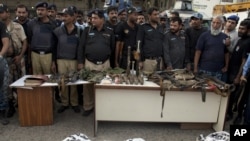The terrorist attack on Pakistan’s busiest and biggest airport in Karachi has stunned many in Pakistan and underscored the security threat facing the country from al-Qaida-linked groups hiding in the volatile northwestern tribal areas along the Afghan border.
The Tehreek-e-Taliban Pakistan (TTP) referred to as the Pakistani Taliban, which is leading the insurgency against the government, has claimed responsibility for the Karachi airport siege that left 28 dead, including 10 attackers.
Taliban spokesman Shihdullah Shahid told reporters the attack was carried out to avenge the death of TTP’s leader Hakimullah Mehsud in a U.S. drone strike in November. He also warned the government not to undertake a military operation against “innocent tribesmen" of North Waziristan tribal district.
The spokesman said the major reason for attacking Karachi airport is “because it serves as the biggest air logistics center supplying goods for the Crusaders’ war in Afghanistan and Pakistan." A large amount of non-lethal military cargo bound for U.S.-led NATO forces in Afghanistan is delivered through the port in Karachi and some is transported by air.
Many analysts say with the situation so complex, the future of peace talks initiated by Prime Minister Nawaz Sharif’s government with the TTP earlier this year looks bleak.
Rahimullah Yusufzai, a veteran journalist and an expert on the Taliban, was a member of the committee the government constituted to hold talks with the TTP. He told VOA's Urdu Service that with attacks like these, public support for talks with the Taliban is dwindling fast.
“The government is now frustrated and feeling the pressure from the army and other quarters for stopping the talks with the Taliban and it unable to do anything,” said Yusufzai.
Recently a strong faction of the TTP announced it is parting ways with the militant network in dispute of the TTP’s leadership. Yusufzai says with Monday's brazen attack, the Taliban may be trying to show that despite the breakup the organization still has the firepower to launch massive attacks in any part of Pakistan.
Anti-terrorism experts also say the TTP may have just used the peace process with the government to gain some time and regroup itself to prepare for spectacular attacks such as the one carried out in Karachi.
“Every party enters negotiations to achieve its own goal and not to help the other party achieve its goal,” security affairs analyst Shahzad Chaudhry said in an interview with VOA Urdu. He said at this point neither the government nor the Taliban appears to consider dialogue as the only way forward.
The Tehreek-e-Taliban Pakistan (TTP) referred to as the Pakistani Taliban, which is leading the insurgency against the government, has claimed responsibility for the Karachi airport siege that left 28 dead, including 10 attackers.
Taliban spokesman Shihdullah Shahid told reporters the attack was carried out to avenge the death of TTP’s leader Hakimullah Mehsud in a U.S. drone strike in November. He also warned the government not to undertake a military operation against “innocent tribesmen" of North Waziristan tribal district.
The spokesman said the major reason for attacking Karachi airport is “because it serves as the biggest air logistics center supplying goods for the Crusaders’ war in Afghanistan and Pakistan." A large amount of non-lethal military cargo bound for U.S.-led NATO forces in Afghanistan is delivered through the port in Karachi and some is transported by air.
Many analysts say with the situation so complex, the future of peace talks initiated by Prime Minister Nawaz Sharif’s government with the TTP earlier this year looks bleak.
Rahimullah Yusufzai, a veteran journalist and an expert on the Taliban, was a member of the committee the government constituted to hold talks with the TTP. He told VOA's Urdu Service that with attacks like these, public support for talks with the Taliban is dwindling fast.
“The government is now frustrated and feeling the pressure from the army and other quarters for stopping the talks with the Taliban and it unable to do anything,” said Yusufzai.
Recently a strong faction of the TTP announced it is parting ways with the militant network in dispute of the TTP’s leadership. Yusufzai says with Monday's brazen attack, the Taliban may be trying to show that despite the breakup the organization still has the firepower to launch massive attacks in any part of Pakistan.
Anti-terrorism experts also say the TTP may have just used the peace process with the government to gain some time and regroup itself to prepare for spectacular attacks such as the one carried out in Karachi.
“Every party enters negotiations to achieve its own goal and not to help the other party achieve its goal,” security affairs analyst Shahzad Chaudhry said in an interview with VOA Urdu. He said at this point neither the government nor the Taliban appears to consider dialogue as the only way forward.









